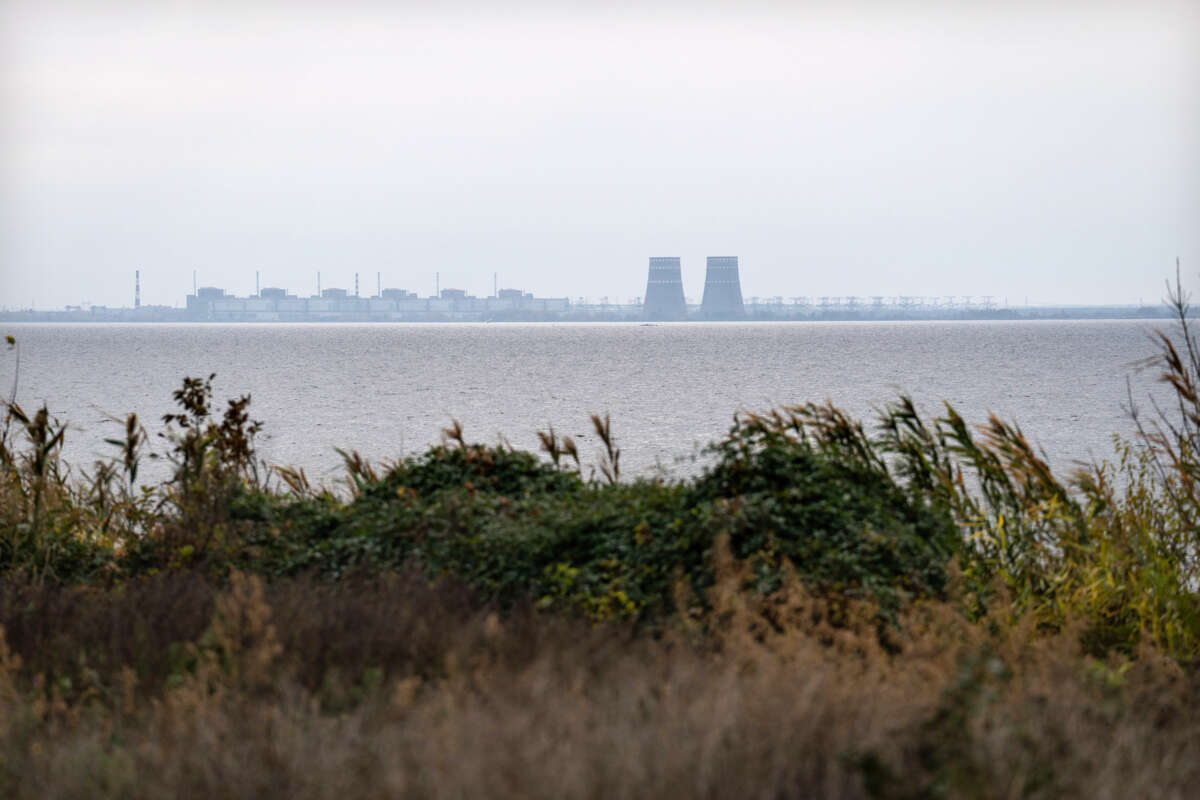Honest, paywall-free news is rare. Please support our boldly independent journalism with a donation of any size.
The largest nuclear energy plant in Europe, located in southern Ukraine, lost all off-site power for the sixth time in a year as Russian forces carried out a massive missile attack on Thursday, once again raising fears of a nuclear catastrophe with continent-wide implications.
Rafael Grossi, director-general of the International Atomic Energy Agency, expressed dismay over the repeated near-misses at the Zaporizhzhia nuclear plant and said he is “astonished by the complacency” in the face of such a threat.
“What are we doing? How can we sit here in this room this morning and allow this to happen? This cannot go on,” Grossi said in a statement to the IAEA Board of Governors. “Each time we are rolling a dice. And if we allow this to continue time after time then one day our luck will run out. I call on everyone in this room today and elsewhere — we must commit to protect the safety and security of the plant. And we need to commit now.”
Grossi noted that Thursday marked the first time since November that the nuclear plant has lost all off-site power, sparking the activation of emergency diesel generators. The IAEA chief said there is enough diesel at the facility to power it for just over two weeks.
A constant supply of power to the plant is necessary to prevent a nuclear meltdown.
“This is the sixth time — let me say it again, this is the sixth time — that the Zaporizhzhia nuclear power plant has lost all off-site power and has had to operate in this emergency mode,” Grossi said. “Let me remind you — this is the largest nuclear power station in Europe.”
Russian forces currently control the nuclear facility, which IAEA inspectors visited in September following months of grave safety concerns.
In the wake of the trip, the United Nations agency issued a report warning that “any further escalation affecting the six-reactor plant could lead to a severe nuclear accident with potentially grave radiological consequences for human health and the environment in Ukraine and elsewhere.”
Last March, Greenpeace released an analysis similarly cautioning that a Zaporizhzhia disaster could “render vast areas of the European continent, including Russia, uninhabitable for decades.”
Energoatom, Ukraine’s state nuclear energy operator, told the Associated Press on Thursday that the power supply to Zaporizhzhia can be restored “within a day or two” and that emergency fixes to a disconnected power line are underway.
Energoatom has accused the Russian forces occupying the plant of compromising its physical integrity. Citing the nuclear energy firm, The New York Times reported earlier this week that “Russian soldiers have recently set up machine guns on the grounds of the plant, placed military equipment in engine rooms, covered windows with sandbags, and even carried out indoor welding work that has set off fire alarms.”
“Those actions come on top of damage from shelling last summer, including to an area where spent nuclear fuel is stored; disruptions to the plant’s management in power struggles with Russian occupiers; and the shutdown of the complex’s six reactors,” the Times noted.
During Thursday’s barrage, Russia reportedly launched more than 80 missiles in the direction of Ukrainian cities — dozens of which were intercepted, according to Ukrainian officials.
AP reported that “the Russian Defense Ministry said the strikes were in retaliation for a recent incursion into the Bryansk region of western Russia by what Moscow claimed were Ukrainian saboteurs. Ukraine denied the claim and warned that Moscow could use the allegations to justify stepping up its own assaults.”
The bombardment came as the prospect of a diplomatic resolution to the war in the near future appeared virtually nonexistent after more than a year of deadly fighting, with Russia continuing its assault on Ukraine while western governments — principally the United States — continue to pump weapons into the war zone.
“Let there be no doubt: Putin should immediately stop this insanity in Ukraine,” The Intercept’s Jeremy Scahill wrote in a column last week. “This is a gruesome and murderous campaign he’s engaged in, and the death toll is shocking. The Biden administration should do what we are constantly told is untenable, unrealistic, or characterized as appeasement: make a negotiated end to the war the top priority.”
“It’s a reasonable position for people watching this bloodbath to want to do everything possible to help Ukrainians defend themselves, and supporting weapons transfers to Ukraine does not make you a pawn of the U.S. imperial state,” Scahill continued. “But the argument over whether the U.S. and NATO should be giving military aid is a trap because it’s presented as a binary choice. What has our government done to seek alternative paths? Has it exhausted all diplomatic efforts?“
Media that fights fascism
Truthout is funded almost entirely by readers — that’s why we can speak truth to power and cut against the mainstream narrative. But independent journalists at Truthout face mounting political repression under Trump.
We rely on your support to survive McCarthyist censorship. Please make a tax-deductible one-time or monthly donation.
